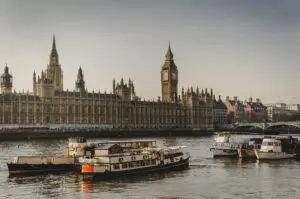The last Labour Government, from 1997 to 2010, was notable for its wide-ranging constitutional reforms, including the removal of most hereditary peers from the House of Lords, the introduction of the Human Rights Act, and the foundation of the Supreme Court. In opposition, Labour under Keir Starmer’s leadership have developed their own plans to reform the UK’s constitution, but these proposals have received relatively little attention. Nevertheless, given how these reforms could change British politics, and with a General Election in six weeks, now is the time to consider these in greater detail.
In 2020, newly elected Labour leader Keir Starmer tasked Gordon Brown with producing a report on proposals to reform the constitution in order to ‘settle the future of the union’.[1] The report of the Commission on the UK’s Future was published in December 2022, entitled A New Britain: Renewing Our Democracy and Rebuilding Our Economy.[2]
What are the proposed reforms?
The Commission on the UK’s Future made forty recommendations. They can be read in full at the bottom of this article, but they can broadly be broken down into three categories:
- New constitutional statutes or legal requirements to enshrine devolution, the autonomy of local government, and social rights
- Further devolution of powers to local government, including powers to drive growth
- Greater cooperation between Westminster and local and devolved governments
- Abolition of the House of Lords, replaced by a new second chamber called the Assembly of the Regions and Nations
These reforms could have a significant effect on how politics operates. Firstly, the proposals could radically devolve power to local and devolved governments, while protecting those powers that these governments already have. Measures such as introducing a ‘legal requirement to require decisions to be taken as close as meaningfully and practicably possible to the people affected by them’ could empower local government to take on new responsibilities and deliver for their areas. This could, if successful, also lead to a reduction of regional inequality.
Secondly, the proposals could entrench certain rights and constitutional provisions against further reform. While it is a long-standing constitutional principle that one Parliament cannot bind its successors, some of the Commission’s proposals seek to protect rights and constitutional provisions against repeal or amendment. The Commission’s suggestion that certain ‘social rights’, such as the right to healthcare free at the point of use, should be ‘constitutionally protected’ and that the new Assembly of the Regions and Nations would have a role in protecting these rights. That would profoundly affect the Parliamentary and constitutional landscape of the country.
Finally, the replacement of the House of Lords with the Assembly of the Regions and Nations would completely transform the Parliamentary process. Not only would this Assembly be elected, unlike the Lords, it would also lose its ability to reject legislation from the Commons, instead only having the right to amend bills.
Nevertheless, there are a number of potential pitfalls with the Commission’s proposed reforms.
Firstly, there is a danger that, in seeking to reform the House of Lords and enshrine certain rights or powers in a ‘constitutional statute’, Labour risks further politicising the judiciary. There is a danger, as we have seen with the Human Rights Act, that policy starts not to be determined by the government or Parliament, but by the courts. This is even more explicit in the Commission’s proposal for the new elected upper chamber, where the Supreme Court is called on to mediate disputes between the two chambers in certain circumstances.[3]
Secondly, there is the danger that these proposals are too weak. Without further funding, greater powers for local government will be ineffective, and unlikely to reduce regional inequality at all.
Finally, there is always the danger of unintended consequences. Many of the constitutional reforms introduced by the last Labour Government, or even the Conservative Government, have backfired in ways that were unexpected at the time. For instance, Scottish devolution, which aimed to neutralise the threat of the SNP, instead emboldened them and led, in part, to the 2014 Independence Referendum. There is a danger that these latest constitutional reform proposals have unintended consequences as well.
Next steps
It is unclear which of the Commission’s recommendations will be included in the Labour manifesto. In March, Lord Mandelson, who works as an unofficial adviser to Keir Starmer, described proposals to reform the House of Lords as half-baked.[4] Furthermore, Labour are likely to use the earlier months of their Government to focus on issues that have a more immediate impact on the public, including public services, transport and employment law.
While some sort of constitutional reform is inevitable, we may have some time to wait.
BREVIA CONSULTING PROVIDES STRAIGHTFORWARD POLITICAL ADVICE AND SUPPORT TO BUSINESSES AND ORGANISATIONS
Discover how Brevia can help you and your organisation by contacting the Brevia Team on 020 7091 1650 or contact@brevia.co.uk
Annexe: Recommendations of the Commission on the UK’s Future:
- The political, social, and economic purposes of the UK as a Union of Nations, which the overwhelming majority of people in the country already accept, should be laid out in a new constitutional statute guiding how political power should be shared within it.[5]
- The common desire for more local control should be reflected in a legal requirement to require decisions to be taken as close as meaningfully and practicably possible to the people affected by them, so putting power and opportunity closer to each citizen,[6]
- There should be a constitutional requirement that the political, administrative and financial autonomy of local government should be respected by central government,
- There should be an explicit constitutional requirement to rebalance the UK’s economy so that prosperity and investment can be spread more equally between different parts of the UK than it is today, thereby equalising living standards across the country over time.
- There should be new, constitutionally protected social rights – like the right to health care for all based on need, not ability to pay – that reflect the current shared understanding of the minimum standards and public services that a British citizen should be guaranteed
- Towns and cities across England should be given new powers to drive growth and champion their areas.
- The UK needs a radically reformed suite of place-based innovation-led R&D programmes, with Mayors, and local leaders in all parts of the UK playing a key role in design and delivery. This should include the replacement for EU regional funding, and future support for the Strength in Places Fund.
- The UK Infrastructure Bank should be given an explicit mission to address regional economic inequality.
- The British Business Bank should be given a new remit to promote regional economic equality in access to investment capital. It should do this by bridging the equity finance gap outside of London and the South East, and should be renamed the British Regional Investment Bank to reflect this change
- There should be an economic growth or prosperity plan for every town and city to contribute to our shared prosperity, owned by Councils, Mayors, towns and cities working in partnership
- 50,000 civil service posts should be transferred outside London, saving at least £200m a year, and the London headquarters of Agencies and Public Bodies should be reviewed and where appropriate relocated
- Local government should be given greater long term financial certainty to enable them to invest more confidently in their areas’ futures
- Local government should be given more capacity to generate its own revenue with new fiscal powers
- Local leaders should be able to take new powers from the centre, through a new, streamlined process to initiate local legislation in Parliament
- There should be “double devolution” that pushes power closer to people – giving them and their community the right to have more of a say on the issues that affect them, the services they use and the places they live
- Enhanced Protection: Scottish devolution should be constitutionally protected by strengthening the Sewel Convention and protecting it from amendment through the new second chamber.
- Enhanced Status in Devolved Areas: The Foreign Affairs reservation should be amended to permit the Scottish government, with the agreement of the Scottish Parliament, to enter into international agreements and join international bodies in relation to devolved matters
- Enhanced Status for MSPs: Members of the Scottish Parliament should enjoy the same privileges and protections as Members of Parliament in relation to statements made in their proceedings
- Enhanced Local Control: There is a strong case for pushing power as close as possible to people in Scotland, and consideration should be given to establishing new forms of local and regional leadership, such as directly elected Mayors
- Enhanced Opportunities for Co-Operation to mutual benefit: There should be not only enhanced self-government for Scotland but strengthened cooperation with the UK Government to address the challenges Scotland faces today
- Enhanced Access to Economic Resources for Scotland: The British Regional Investment Bank should maximise support for innovation and investment in Scotland, in conjunction with the Scottish National Investment Bank and the European Investment Bank
- Enhanced Protection: Welsh devolution should be constitutionally protected by strengthening the Sewel Convention and protecting it from amendment through the new second chamber.
- Enhanced Role for Members of the Senedd: the Welsh Senedd’s members should, if desired, enjoy the same privileges and protections as Members of Parliament in relation to statements made in their proceedings.
- Enhanced Powers: New powers should be made available to the Senedd and Welsh Government, including embarking upon new powers over youth justice and the probation service
- Enhanced Access to Economic Resources for Wales: The British Regional Investment Bank should maximise support for innovation and investment in Wales, in conjunction with the Welsh Development Bank and the European Investment Bank
- We support devolution in Northern Ireland, consistent with the principle of consent and the commitments made in the Good Friday Agreement and wish to see it restored and strengthened.
- Enhanced Access to Economic Resources for Northern Ireland: The British Regional Investment Bank should maximise support for innovation and investment in Northern Ireland, in conjunction with Invest NI and the European Investment Bank
- There should be a ‘solidarity clause’, a legal obligation of cooperation between the different levels of government and institutions across the UK
- The UK needs a new and powerful institution to drive cooperation between all its governments – a Council of the Nations and Regions
- the structures of cooperation and of central government and Parliament should respect and recognise those areas of decision making that are England-only.
- there should be Joint Policy Initiatives in areas of common interest, from climate change to security, which should embed cooperation between different levels of Government.
- International trade policy should be made more inclusive of devolved leaders across the UK, and have an explicit focus on reducing the UK’s regional economic inequality
- UK wide departments and public bodies should as a matter of course be obliged to make space in their governance and oversight arrangements for national and regional representation
- We must clean up our politics with new rules for politicians and civil servants, new powers to clamp down on outside earnings for MPs, new laws to eliminate foreign and corrupt money from UK politics, and powerful new institutions to enforce these to replace current institutions that have failed.
- There should be a greater role for the public in making and enforcing the rules followed by politicians.
- There should be a powerful new anti-corruption Commissioner to root out criminal behaviour in British political life where it occurs
- The House of Lords should be replaced with a new second chamber of Parliament –An Assembly of the Nations and Regions
- The new second chamber should complement the House of Commons with a new role of safeguarding the UK constitution, subject to an agreed procedure that sustains the primacy of the House of Commons
- The new second chamber must have electoral legitimacy, and should be markedly smaller than the present Lords, chosen on a different electoral cycle – with the precise composition and method of election matters for consultation.
- We recommend that the necessary consultation and preparatory work should begin now, and this should include a ground-up conversation with the people of Britain
[1] Sir Keir Starmer MP, Labour conference speech, 29 September 2021, link
[2] Labour Party, Report of the Commission on the UK’s Future, December 2022, link
[3] Ibid, p.141
[4] BBC News, Labour Lords reform plan not ready, says Lord Mandelson, 5 March 2024, link
[5] Labour Party, Report of the Commission on the UK’s Future, December 2022, p.67, link
[6] Ibid, p.70







